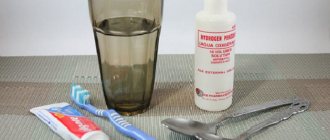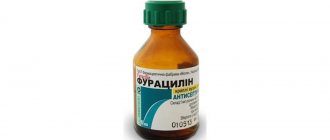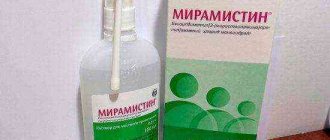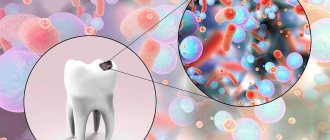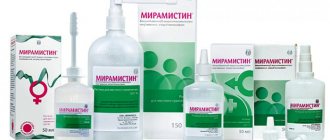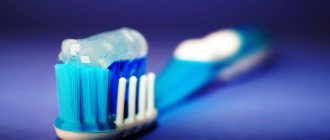Hydrogen peroxide is a substance that modern people always have at hand, because it is used in medicine and in everyday life, in clinics and at home. Recently, many useful tips have appeared on the use of this drug for rinsing the mouth for the purpose of disinfection, gum treatment and teeth whitening. But any medicine has contraindications and negative effects , so first you should figure out whether it is possible to rinse your mouth with hydrogen peroxide and how it should be diluted.
Is it possible to rinse teeth and gums with hydrogen peroxide?
You can rinse your mouth with hydrogen peroxide without harm to your teeth and body, but only with a solution with a concentration of no more than 3%. When rinsing your mouth with this liquid, several effects occur simultaneously:
Disinfection of the oral cavity.- Acceleration of healing of wounds and inflamed mucous membranes.
- Drying of the mucous membrane.
- Enamel whitening.
- Stopping minor bleeding.
- Cleansing the oral cavity from crusts, scabs, remnants of blood clots after injuries and operations.
This complex effect has led to the widespread use of this product in dentistry. Dentists prescribe peroxide rinses for the following conditions:
- Oral infections – stomatitis, candidiasis.
- Inflammatory processes - gingivitis, periodontitis, periodontal disease.
- Bleeding gums.
- Presence of dark spots on the enamel.
- The presence of bad breath is halitosis.
The product is used in the treatment of sore throat, otitis media and runny nose, as well as when lips become inflamed due to herpes. To do this, take a diluted solution, but it can only be used after consultation with the attending physician.
Step-by-step instructions for breeding
To disinfect pool water, it is better not to buy a technical solution, since it contains an admixture of salt and metals . This will slow down the decomposition of the peroxide.
The best option would be peroxide, used in medicine with a concentration of 35% to 37%. It is also the safest solution for humans.
Sometimes pool owners use a highly concentrated mixture of 60%. It is recommended to dilute it to 30% or lower. This is necessary for safe work with peroxide and to eliminate the possibility of damage to metal parts of the structure, which will lead to rust in the water.
In what and how?
A regular plastic canister is suitable for diluting a highly concentrated solution. To dilute the concentrated solution, use plain water.
To determine the amount of water for diluting 60% peroxide to 35%, you can use the following formula 1*0.6/0.35 – 1 = 0.71, where:
- 1 – one gram of water;
- 0.6 – peroxide 60%;
- 0.35 – peroxide 35%;
- 0.71 – amount of water for dilution.
This means that 1 liter of perhydrol will require 710 grams of water to make a 35% solution. The solution can only be mixed with drinking water that does not contain chlorine.
Cautions when rinsing teeth with hydrogen peroxide
To many, hydrogen peroxide seems like the most harmless antiseptic, but it has many contraindications and requires caution when used. The drug should not be used:
- For severe bleeding gums in patients with periodontitis.
- If there are a large number of fillings.
- Patients with a thin layer of enamel and caries.
- During pregnancy and lactation, due to the possible consequences of rinsing the mouth with hydrogen peroxide, not only for the mother, but also for the baby.
- For the treatment of children under 12 years of age. Children may rinse incorrectly and swallow the product. In addition, they are more sensitive to the unpleasant taste of the drug, which may cause them to vomit.
- During antibiotic treatment.
Hydrogen peroxide should not be taken orally. A solution with a concentration of more than 3% should not be used even for rinsing the mouth; it should be diluted.
Hydrogen peroxide must not only be used correctly, but also stored with precautions. A bottle of peroxide solution, perhydrol or hydroperite tablets - other pharmacological forms of this drug - should not be left in places accessible to children. Poisoning with this drug can be fatal. It is better to store the drug in a closed cabinet in a room where there is no strong increase in air temperature, otherwise it will lose its properties.
Factors affecting the concentration of the product
To determine the required concentration, a number of factors should be taken into account. First of all, this is the degree of pollution and the volume of the pool. For convenience, the level of pollution can be divided into 3 categories :
- low,
- average,
- high.
Table of relationships between factors and concentration:
The concentration is given per 1000 liters of water.
If concentrated peroxide has been stored for 6 months, its effectiveness when used will be reduced by 10-15% compared to the last time. Therefore, calculations should be made taking into account these losses.
How to properly prepare the solution and rinse your mouth
Before you rinse your mouth with hydrogen peroxide, you need to dilute it. It is recommended to take a tablespoon of hydrogen peroxide per glass of water. The solution should not be hot, but not cold either. Rinsing begins only after thoroughly brushing your teeth and rinsing the mouth with clean water; such manipulations will prevent unwanted chemical reactions between the components of the drug and the toothpaste.
The peroxide solution should not be kept in the mouth for too long; it is recommended to carry out the procedure for no longer than 10 minutes. During this time, you should periodically spit out the liquid and put a fresh portion into your mouth. After the procedure is completed, the product is spat out so that it does not remain in the mouth or enter the digestive system.
If the rules of rinsing are violated, nausea and vomiting may occur; in severe cases, burns of the digestive organs may occur. If you feel a strong burning sensation during the procedure, especially if there are ulcers on the oral mucosa, you should stop rinsing and rinse your mouth with clean water.
How to carry out the procedure?
To prepare a solution for mouth rinsing, you need to purchase a 3% solution of hydrogen peroxide and dilute it with clean, warm boiled water in the proportion of 15 drops of peroxide per 100 ml of water. If hydroperite is to be used, 1 tablet is dissolved in a glass of water.
The essence of the procedure is very simple - you need to take the solution into your mouth and rinse your mouth for a couple of minutes . The liquid is then spat out and collected again. Each time for the procedure, you should prepare a fresh portion of the solution - you cannot store the prepared solution.
As mentioned earlier, to relieve the unpleasant aftertaste, it is recommended to rinse your mouth with clean water at the end of the procedure. To consolidate the positive effect, you can rinse your mouth after peroxide with a decoction of medicinal herbs - chamomile, sage or mint.
It is recommended to rinse with peroxide several times a day . As for the course of therapy, it depends on the cause of bad breath. For example, for stomatitis or periodontitis, the course of treatment is a week.
If the cause of the unkempt odor is aphthous stomatitis, it is better not to rinse your mouth with peroxide, but to soak cotton pads in it and apply them to the affected areas for 1 minute. This procedure should also be carried out several times a day. You need to rinse your mouth more than half an hour before meals.
If, when rinsing, unpleasant sensations are observed - itching or burning, the procedure should be stopped immediately , and the oral cavity should be thoroughly rinsed with water. If peroxide has caused severe irritation of the mucous membranes, it is recommended to rinse your mouth with infusion of chamomile.
Experts advise avoiding the consumption of acidic and alkaline foods during treatment. You should also refrain from drinking alcohol and coffee - these habits negatively affect the gums and mucous membranes, and also accelerate the development of inflammatory processes in the oral cavity.
There is another way to use hydrogen peroxide - massage your gums with peroxide and soda balls. The recipe is simple :
- a teaspoon of soda is mixed with 10 drops of a 3% peroxide solution;
- the mixture rolls into a hard ball;
- the ball is applied to the gums and a 10-15 minute massage is performed;
- The therapeutic course continues until the bad breath is completely eliminated.
Important! It is not advisable to use peroxide to rinse your mouth for a long time - it may dry out the mucous membranes and damage them.
We invite you to watch an informative video about rinsing the mouth with hydrogen peroxide:
Can peroxide be used to whiten teeth?
Hydrogen peroxide can be used to whiten tooth enamel only if there are no contraindications. To make sure that the enamel layer is strong enough and not too thin, it is better to visit a dentist and consult with him about the possibility of using this product.
The following whitening methods are known:
- They take a mixture of hydrogen peroxide and soda, sometimes diluted with eucalyptus oil. The paste is applied to a toothbrush. After brushing your teeth, you need to rinse your mouth. Food can be taken no earlier than 20 minutes after the procedure.
- Three drops of the product are placed on toothpaste; it is recommended to use toothpaste for the treatment of periodontal disease.
- If there is a limited stain on the enamel, you can clean it with a cotton swab dipped in hydrogen peroxide. But first you need to undergo an examination by a dentist so as not to provoke the destruction of the enamel.
- Instead of a pharmaceutical 3% solution, sometimes they take hydroperite tablets and dissolve them in clean water: 2 tablets per 100 ml.
Teeth before and after whitening with hydrogen peroxide
Is it necessary to dilute?
To disinfect a swimming pool, peroxide should only be used in a diluted state. Concentrations of 60% and above are explosive .
If dirt gets into the container, it will trigger a chain reaction of decomposition into oxygen and water, followed by heating.
The temperature will rise up to 1000°. The water will immediately turn into a gaseous state, which will be 7000 times its previous volume. Therefore, the lower the concentration of the solution, the safer it is to work with it .
If peroxide is not diluted or a high concentration is used, during bathing the undecomposed reagent will enter the mouth, stomach, eyes or nasopharynx. This will lead to disruption of the immune system.
In a child, this can cause exacerbation of chronic diseases, as well as disorders of the gastrointestinal tract. However, if you use a weak solution, it will be useless to fight bacteria. This will also lead to the global development of pathogens.
Rinsing your mouth with hydrogen peroxide to remove odor
Halitosis can be caused by many dental and internal diseases. Hydrogen peroxide helps get rid of unpleasant odor if the cause of its occurrence is related to the condition of the oral cavity. Rinsing the mouth with this product for gumboils, periodontal disease, stomatitis, and gingivitis helps eliminate pathogenic microflora from the surface of the oral mucosa. And along with it, the smell, which is a consequence of the vital activity of microbes, disappears.
If the cause of halitosis is diseases of the internal organs, hydrogen peroxide will not be able to effectively combat oral odor. Disturbances in the functioning of the kidneys and liver, diabetes mellitus provoke the appearance of various foreign odors from the mouth, even with an admixture of chemicals: acetone, ammonia. They also cannot be eliminated by rinsing; targeted complex treatment is necessary.
In case of dysbacteriosis or infectious inflammation of the ENT organs, which also cause a putrid odor in the mouth, peroxide, when used correctly, can reduce the intensity of the amber.
To rinse your mouth, hydrogen peroxide must be diluted with water (pre-boiled). You need to rinse your teeth and gums for a minute 1-3 times in a row, after which the mouth is rinsed with clean water. The procedures are done three times a day for 3–5 days.
Medicinal properties
For inflammation of the tonsils and mucous tissue, adults and children can gargle with peroxide; the product is an excellent antiseptic and quite safe.
It is a clear, odorless liquid with a slight metallic taste; it dissolves easily in water. If the drug is released in tablet form, it is called hydroperite.
It has oxidative and reductive properties, is very effective even for purulent inflammation of the ENT organs, destroys viruses, fungi and bacteria, eliminates redness and soothes tissues. The medicinal properties are as follows:
- Treatment of arthrosis of the knee joint according to Neumyvakin: compresses of hydrogen peroxide and soda
1Disinfection - thanks to this, viruses, bacteria and yeast-like fungi die, which is why it is used in the treatment of the nose, throat, purulent lesions on the skin, cuts and ulcers. 2Oxygen enrichment - treated tissues are more easily saturated with nutrients and oxygen, which affects rapid recovery and healing. Pain also goes away, the healing process accelerates.3 Increased blood circulation - after treatment, blood flows better to the affected area, tissues are restored faster.
4Increasing local immunity - treatment with the product stimulates the body’s own protective functions, increasing the ability of the laryngeal epithelium to independently fight infectious agents. 5Cleansing - when the throat becomes inflamed, the enzyme catalase is formed on the surface of the mucous membrane. The drug comes into contact with it, forming foam, with which particles of pus and dirt, as well as dead tissue, come out of the layers of tissue. Thanks to this action, the mucous membrane heals faster and is cleansed much deeper. Source: nasmorkam.net If the drug is used correctly in the treatment of inflammation of the larynx, after 1-2 days you can notice an improvement in well-being, cleansing of the mucous membrane from purulent-necrotic plaque, and a decrease in temperature.
Particular attention is paid to the product by people who do not want to immediately begin drug treatment for colds and inflammatory diseases, because peroxide is a safe and effective antiseptic.
Pros and cons of using hydrogen peroxide to treat teeth and gums
Based on the available reviews and opinions of people who have used hydrogen peroxide solution for mouth rinsing, this product has the following advantages and disadvantages:
| Advantages | Flaws |
| Complex therapeutic effect, noticeable improvement in oral health. | Possible consequences if used incorrectly. |
| The safety of rinsing gums with hydrogen peroxide if the proportions are observed. | Unpleasant taste in the mouth during and after the procedure. |
| Availability in all pharmacies and low price. | Burning in the mouth when rinsing, especially in the presence of wounds. |
People who often rinse their teeth with this product recommend rinsing their mouth with an infusion of herbs with a pleasant smell after the procedure. This helps reduce the feeling of unpleasant taste and prevent the gag reflex. If you feel a burning sensation, you can dilute the solution to a lower concentration.
Hydrogen peroxide is a useful, widely available remedy that helps fight the symptoms of various dental inflammations. Therefore, it is often prescribed in dentistry and otolaryngology.
To dilute peroxide in the correct proportions in each specific case, an individual consultation with a clinic physician or dentist is advisable. After using the product for any purpose, rinse your mouth thoroughly with boiled water.
Gargling for adults
It is not difficult for adults to use the medicine in the fight against sore throat. As for any other group of patients, a 0.25% solution is used.
An additional effective remedy would be to lubricate the mouth during illness. The wiping solution should be slightly higher in concentration than the rinse solution, so you need to know exactly how much peroxide you need.
15 ml of peroxide is diluted in half a glass of warm water. A cotton swab is soaked in the liquid and the oral cavity is soaked as deeply as possible. It is an effective and more effective way to combat tonsillitis.
Frequency of application of disinfection solution
To determine how often to disinfect your pool, you should pay attention to the weather .
For example, if there are many sunny days in a month and the weather is hot, in this case the treatment is carried out 2 times a month. At a temperature of 25C° and a moderate number of sunny days, the frequency can be reduced to 1 time.
It is also worth considering the contamination of the pool. There is no need to wait until it becomes too cloudy.
To determine the degree of contamination, you can take water into a transparent glass container and compare it with clean drinking water . If there is a yellowish tint and an unpleasant odor, it is time to disinfect.
Rules for preparing a rinse solution at home
To prepare a “rinse” that will have a positive effect and minimize possible risks associated with irritation of the delicate tissues of the oral cavity, take hydrogen peroxide and water. As for water, it is best to use boiled water, room temperature or warm. They need to be mixed in the following proportions:
- 1 teaspoon per 120 ml: these dosages are recommended for preparing the solution for children from 5 to 10 years old and pregnant women,
- 1 tablespoon per 120 ml: for adults and children over 16 years old.
Important ! Do not exceed the concentration of the active substance or use it in combination with herbal decoctions and other solutions, as this will sharply reduce the effectiveness of the product. Exceeding the concentration can be dangerous due to tissue burns.
The secret of success is strict adherence to the recipe
You cannot use peroxide sold in pharmacies in its pure form for rinsing. Even despite its low concentration. The maximum that can be done with the undiluted composition is to spot treat ulcers and wounds.
Contraindications for use
You should not use the product in cases where you have very sensitive enamel or multiple untreated caries. Here it can have an even more irritating effect and increase unpleasant symptoms.
Teeth may become sensitive due to the development of caries
It is worth discarding it if there are signs of allergies (swelling of tissues, rashes and itching, sore or sore throat) and increased sensitivity of tissues to peroxide. If after its use the unpleasant symptoms intensified, bleeding and hyperesthesia appeared, then there is no need to continue rinsing further.
Many experts also do not recommend rinsing the mouth with peroxide for pregnant and lactating women and children (in particular those under 3 years old). Or do it with great caution. After all, there is always a risk of swallowing the composition, which can cause indigestion and severe heartburn.
Important ! If for some reason undiluted 3% pharmaceutical hydrogen peroxide gets into the esophagus, then in order to avoid irritation and even burns of mucous tissue, the following measures should be taken immediately: drink enough water and enterosorbent.


